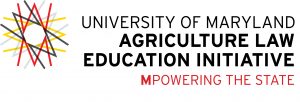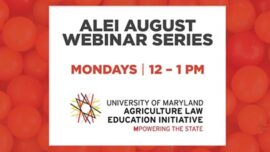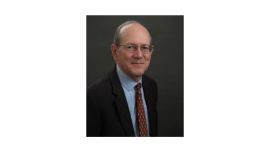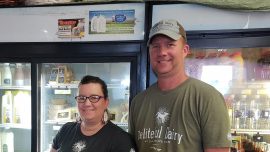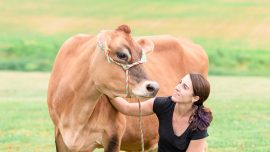August 2021 Update

2021 Annual Agricultural and Environmental Law Conference!
MyFaRM Classes Will Resume This Fall
Upcoming ALEI August Webinar Series, “Harnessing Your Farm’s Story to Build a Successful Farm Brand”
2021 Annual Agricultural and Environmental Law Conference!
By: Meghana Kotraiah
Each year, the Agriculture Law Education Initiative (ALEI) hosts a conference bringing together agricultural professionals, attorneys, educators, environmentalists, farmers, policymakers, and students to discuss the complex intersection of environmental regulation and agriculture in Maryland. This conference provides a forum for exchanging ideas and education on current topics and events related to the intersection of agricultural and environmental law.
Show More During our virtual conference last November offered over the course of six sessions, panel topics focused on the impact of COVID-19 on Maryland’s dairy industry, air quality, the Conowingo Dam Settlement, 2025 Chesapeake Bay restoration goals, Waters of the U.S., and developing topics in agricultural, environmental, and food law. Over 150 people attended, and the virtual format allowed for participation from 16 different states, and international attendees. This year, the conference will again be held virtually. The annual conference will focus on the following sessions: For more details, including panelists and panel descriptions, please visit our website: 2021 Annual Agricultural and Environmental Law Conference. We also want to extend our deepest gratitude to our conference sponsors. Your continued support is much appreciated. If you or your organization would like to join us as a sponsor, please reach out to us at umaglaw@umd.edu. ALEI looks forward to welcoming you to our 2021 Agricultural and Environmental Law Conference! Close
MyFaRM Classes Will Resume This Fall
By: Nicole Cook
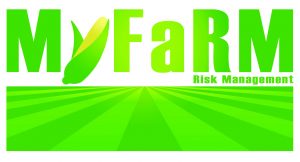
After a long break, MyFaRM classes will resume this fall!
MyFaRM is a series of free classes that farmers can attend to learn how to develop personalized risk management plans in the areas of (1) production, (2) marketing, (3) finances, (4) human resources, and (5) legal risk. The program focuses on providing deep learning through in-person instruction. Due to the pandemic, the MyFaRM classes had to be postponed until in-person classes could safely resume. Nicole Cook, Environmental and Agricultural Faculty Legal Specialist at the University of Maryland Eastern Shore, announces that the MyFaRM classes will start again in the fall and will run through spring 2022. The in-person classes will cover legal risk, production risk, and marketing risk.
Show More The MyFaRM team of instructors includes experienced educators from ALEI, UMES Extension, University of Maryland Extension, Virginia State University, MARBIDCO, MidAtlantic Farm Credit, and other industry experts including farmers with experience in diversifying their farms and developing niche markets for their products. “Graduates” of the MyFaRM program will develop a five-year risk management plan for their farms. Additionally, for those who are not able to attend the classes in person, the MyFaRM team is working with The Carlin Company to offer all of the MyFaRM lectures and course materials in a 10-part series of online, self-guided educational webinars that will be available next summer for free. For more information about the MyFaRM program and to register for classes, contact Nicole Cook at nlcook@umes.edu or 410-651-6182. Close
ALEI Recognizes Mayhah Suri’s Six Years of Service and Welcomes Elizabeth Thilmany to the Agriculture and Resource Economics (AREC) Faculty Specialist Position
By: Elizabeth Thilmany
After six years working for the University of Maryland, Mayhah Suri has accepted a new position with a consulting firm. “I would like to thank the ALEI team, partners, and colleagues for the many opportunities to learn and help support Maryland agriculture,” Suri said. During her time with ALEI, Suri established resources for the farm brewing and distilling industry. Suri was actively involved with the farm succession program by providing leadership in planning the workshops, additional resources, and leading the goal setting and communication sessions during succession workshops. The ALEI team is grateful for Suri’s efforts during her six years of service and wishes her future success in her new position.
Show More Stepping into the Faculty-Specialist position is Elizabeth Thilmany. Originally from Fort Collins, Colorado, Elizabeth attended the University of Maryland – College Park (UMD) to study Agriculture and Resource Economics and understand Maryland agriculture. This past May, Thilmany graduated cum laude with a B.S. in Agribusiness and a minor in Geographic Information Sciences. As an undergraduate, Thilmany actively pursued research opportunities in agriculture and natural resources. During her sophomore year, Thilmany participated in the Snider Undergraduate Research Experience at UMD to complete research on the legal implications of industrial hemp production for American farmers. She also worked on a life-cycle assessment of industrial hemp production in an attempt to determine whether hemp is a “greener” alternative to other fiber crops like cotton. During Thilmany’s undergraduate years, she served as a Pathways Intern with Agriculture Research Services at the National Agriculture Library (NAL) in Beltsville during the summer of 2019, working with the Information Systems Division to improve its internal documentation and supporting NAL’s efforts to digitize historic agriculture documents. Thilmany served as Chair of AGNR’s Dean Student Advisory Council, where she connected AGNR students to the College’s resources while providing student feedback to leadership. She also served as a Resident Assistant for three years, where she honed her leadership and collaboration skills to support residents’ academic and personal needs. Since 2019, Thilmany has worked as an undergraduate research assistant in the Department of Agriculture and Resource Economics (AREC.) Currently, she is finalizing work on CONSERVE’s reclaimed water policy project while conducting initial research on farm succession modeling for Maryland farms. “I am looking forward to the opportunity to work with and learn from the ALEI legal specialists and to continue to expand my understanding and research of natural resource conservation efforts within the agriculture industry,” Thilmany said. As she transitions into the Faculty Specialist position, she will join two multi-year ALEI projects. The first project is research on solar leasing on farmland, developing education materials alongside Cornell University and Oklahoma State University for the Solar Energy Production on Agricultural Land: Risks and Opportunities project. For the second project, Thilmany will join researchers and extension specialists from the University of Kentucky, the University of Tennessee, and Drake University to support farmers navigating hemp production as part of the Managing Risks in Hemp Production: Contract Development and Crop Insurance Decisions project. Close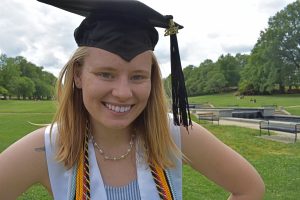
Ellis Collier joins ALEI as a Senior Legal Research Associate to work on Heirs Property Needs Assessment for Maryland

By: G. Ellis Collier
ALEI has recently hired Ellis Collier as a Senior Legal Research Associate. Ellis is the first to ever hold this position at the University of Maryland Eastern Shore (UMES) campus and his addition to ALEI will prove to be valuable. Ellis graduated with honors from UMES in 2016. From there he went on to receive his Juris Doctorate from the University of Arkansas School of Law. Throughout his professional and academic career, Ellis has held various positions within the U.S. Department of Agriculture, the National Agricultural Law Center, and Minorities in Agriculture, Natural Resources, and Related Sciences. “Growing up on the eastern shore of Maryland in a farming community, agriculture has always been an important part of my life, and I am excited to use my knowledge and skills to help educate the agriculture community,” said Ellis.
Show More Although Ellis will work on many areas of the law that impact producers, one particularly important project that he is currently working on is an Heirs Property Needs Assessment for Maryland. Over the past century, heirs property has been a major issue across the U.S., especially for farming communities where the legacy of heirs property has resulted in devalued property, partitioned land, and financially hindered farming families. This issue in particular has been linked to the drastic decline in minority farmers over the past century. In 1910, African American farmers owned 16 percent of all farmlands in America. Today, African Americans represent less than 2 percent of American farmland. There are a number of factors that have contributed to the decline in African American-owned farmland. One factor is the practical effects of the series of Homestead Acts enacted after the Civil War, which helped white citizens and immigrants obtain land while excluding African Americans. The Homestead Acts, enacted between 1862 and 1938, were the government’s post-civil war response to the end of slavery and were designed in theory to give African American farmers the opportunity to claim unoccupied land. However, due to various structural impediments, the Act significantly disadvantaged African American communities in practice. Another contributing factor is the cycle of debt that African American farmers have faced due to discrepancies in accessing and obtaining federal loans. As has been acknowledged by the USDA, historically, African American producers and farmers of color have experienced systemic discrimination that has kept them from benefitting from many federal loan assistance programs, which in turn has helped contribute to crippling debt among African American farmers and often led to the loss of their land. Moreover, legislation in the 1930’s such as the Agricultural Adjustment Act, introduced a practice in lending known as “redlining” which devalued acres of farmland and property owned by African Americans throughout the country, including Maryland. And still, another factor is the lack of education that has been provided to African American farmers on how to convey title to heirs. This has led to improper real estate practices, resulting in farmers acquiring debt on farming property and ultimately losing the land in foreclosures. Educating the agriculture community on this issue is one of the reasons why this project is so important. The term “heirs property” refers to instances when someone dies without a will and the title to their property is passed down to their heirs. Because the individual died without a will, the title of the property becomes unclear, a situation which is commonly referred to as a “clouded title.” A clouded title is when you have a number of identified or unidentified heirs who all have an equal interest in, and ownership of, the land as a whole. In this scenario, the heirs are considered by law as tenants-in-common, which means all of the heirs have an equal ownership interest in the property. When the heirs are deemed tenants-in-common, it can create a series of problems. One problem is the heirs do not qualify for government assistance, such as loan assistance because government loan programs require the property to have an owner with clear title to the property. The same holds true for private lenders. Moreover, most heirs do not know how to find the original title to the property, which makes it nearly impossible for an heir to obtain a clear title. Because all of the heirs have equal ownership, another problem arises if one heir has a dispute about their share of the property. The heir can force a sale of the entire property with the proceeds from the sale to be equally distributed among the heirs. For example, if a descendant has three heirs, all deemed to be tenants-in-common, and one of the heirs is dissatisfied with how the other two heirs have used the property, the displeased heir can force a sale of the property. This action is called a partition by sale and Maryland’s courts have historically leaned toward settling disputes between heirs by using this method of resolution. However, not only does a forced sale often lead to a loss of ownership for all heirs, it’s also often associated with a loss in intergenerational wealth because the property is not sold at the fair market value. While the definition of heirs property is well known, the challenges associated with it are not. This is why more information is needed about the repercussions associated with heirs property. This is where the Needs Assessment project becomes important. ALEI is conducting the project in two phases. In the first phase, Ellis will help develop and dispatch a statewide survey, including rural and urban areas, which will provide data on the prevalence of heirs property in Maryland. Ellis will also be responsible for assessing the need for education around the issue, including, but not limited to, how to identify when the property may be held by several heirs, the challenges associated with heirs property, and the options and resources available for obtaining a clear title. In the second phase of the project, Ellis will co-author a report based on the data gathered from the survey. ALEI plans to release the report in the fall and will be relying on assistance from all of our ALEI partners and supporters, including producers, Extension agents, and agriculture professionals to help ensure the survey reaches every Marylander. So, thank you in advance for your assistance! The mission of ALEI is to address the legal needs and concerns of the agriculture community. This project is one of many initiatives on which ALEI is working. In his new role, Ellis plans to help provide our supporters and partners with the legal knowledge they need to effectively and profitably sustain farming operations in the communities they serve. Close By: Megan Todd In August 2021, ALEI will host a three-part webinar series to discuss branding strategies for farmers, “Harnessing Your Farm’s Story to Build a Successful Farm Brand.” These webinars will revisit topics covered in the Legal Guide to Direct Farm Marketing for Maryland Produce Growers, which was published in December 2020 by ALEI team members Sarah Everhart and Margaret Todd. However, instead of covering all the topics in the Legal Guide, these 90-minute sessions will be opportunities to help farmers strengthen their farm marketing strategies by hearing from BIPOC farmers about their branding journeys and learning about the legalities of branding, digital marketing, and protecting intellectual property. Show More Developing a consistent and appealing farm brand can be a key step to attracting consumers, and hopefully gaining loyal customers. Increased direct marketing of farm products is a clear trend over the past several years, as seen in the United States Department of Agriculture’s 2017 annual farm census data. Additionally, changes in the consumer habits over the past year forced many local farm businesses to adapt and pivot marketing and sales practices as customers shifted to online ordering and sought more options for purchasing local produce. When shoppers are browsing their options online using social media or search engines, a clear and well thought out farm story can make the difference. Over three Wednesdays in August, attendees will have an opportunity to hear from four farmers and two attorneys focusing on three aspects of building up a farm brand. One of the goals of this series is to feature local BIPOC farmers from Maryland, Virginia, and Washington, D.C. who can share their experiences and knowledge with building their own farm brand identity, pursuing digital marketing channels, and taking stock of their intellectual property. According to USDA 2017 ag census, BIPOC farmers own approximately 10% of farms nationally, and that rate drops to only 6.4% of farms in Maryland and 5.6% in Virginia. Data also shows that BIPOC farmers tend to operate on smaller than average plots of land, with an approximate average of 10-19% of farmers directly marketing their products. Holding an event to highlight BIPOC farmers is just one of the ways ALEI can work to ensure the unique needs and perspectives of all farmers in the state are heard. To register for this event, visit https://sites.google.com/umaryland.edu/aleiaugust-2021-webinar-series/register. Anyone with questions can contact Megan Todd (motodd@law.umaryland.edu). CloseUpcoming ALEI August Webinar Series, “Harnessing Your Farm’s Story to Build a Successful Farm Brand”

